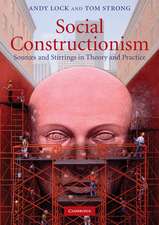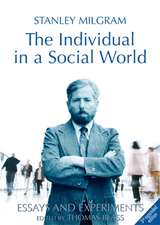Introduction to Computational Cultural Psychology: Culture and Psychology
Autor Yair Neumanen Limba Engleză Paperback – 5 feb 2014
| Toate formatele și edițiile | Preț | Express |
|---|---|---|
| Paperback (1) | 246.42 lei 6-8 săpt. | |
| Cambridge University Press – 5 feb 2014 | 246.42 lei 6-8 săpt. | |
| Hardback (1) | 540.95 lei 6-8 săpt. | |
| Cambridge University Press – 5 feb 2014 | 540.95 lei 6-8 săpt. |
Din seria Culture and Psychology
-
 Preț: 207.44 lei
Preț: 207.44 lei -
 Preț: 284.78 lei
Preț: 284.78 lei -
 Preț: 331.66 lei
Preț: 331.66 lei -
 Preț: 316.28 lei
Preț: 316.28 lei - 11%
 Preț: 447.69 lei
Preț: 447.69 lei -
 Preț: 329.32 lei
Preț: 329.32 lei -
 Preț: 293.55 lei
Preț: 293.55 lei -
 Preț: 283.63 lei
Preț: 283.63 lei -
 Preț: 356.91 lei
Preț: 356.91 lei -
 Preț: 320.93 lei
Preț: 320.93 lei -
 Preț: 280.74 lei
Preț: 280.74 lei
Preț: 246.42 lei
Nou
Puncte Express: 370
Preț estimativ în valută:
47.15€ • 49.23$ • 38.94£
47.15€ • 49.23$ • 38.94£
Carte tipărită la comandă
Livrare economică 15-29 aprilie
Preluare comenzi: 021 569.72.76
Specificații
ISBN-13: 9781107661585
ISBN-10: 1107661587
Pagini: 226
Ilustrații: 17 b/w illus. 10 tables
Dimensiuni: 152 x 228 x 13 mm
Greutate: 0.34 kg
Ediția:New.
Editura: Cambridge University Press
Colecția Cambridge University Press
Seria Culture and Psychology
Locul publicării:New York, United States
ISBN-10: 1107661587
Pagini: 226
Ilustrații: 17 b/w illus. 10 tables
Dimensiuni: 152 x 228 x 13 mm
Greutate: 0.34 kg
Ediția:New.
Editura: Cambridge University Press
Colecția Cambridge University Press
Seria Culture and Psychology
Locul publicării:New York, United States
Cuprins
1. What is computational cultural psychology?; 2. The digital psychologist: information technology and cultural psychology; 3. Why don't primates have God? Language and the abstraction of thought; 4. Lost in translation: how to use automatic translation machines for understanding 'otherness'; 5. Spies and metaphors: automatic identification of metaphors for strategic intelligence; 6. Scent of a woman: the mediation of smell and automatic analysis of extended senses; 7. Dolly Parton's love lexicon: detection of motifs in cultural texts; 8. The relational matrix of the I; 9. Identifying themes: from the Wingfield family to Harry and Sally; 10. Eating and dining: studying the dynamics of dinner; 11. Getting even: the cultural psychology of revenge and what computers can do about it; Epilogue. On generals and mail coach drivers.
Recenzii
'The cognitive sciences have been motivated and guided by the premise that human mentality can be modeled in computational ways through algorithms and other computer formats. The underlying assumption has always been that cognition can be studied as a universal state of the brain independently of its location in space and time. This book challenges this assumption by showing, brilliantly, how cognition is an intricate product of the interaction of the brain, the body, and the situation. Neuman's revision of the algorithmic principle in semiotic terms is truly masterful, showing how computation can serve the modeling process, not dominate it. This work is required reading for all cognitive scientists. It illuminates the core of the modeling problem and shows which path the cognitive sciences must follow in the future in a world that has extended the brain and its capacities in the computational realm of the global village.' Marcel Danesi, University of Toronto and Editor of Semiotica
'Introduction to Computational Cultural Psychology advances the field beyond the thinking of other merely applied paradigm of computational thinking of social science, which could only mediate at best between tools of computational science and its target application the social domain, which is inherently complex. Neuman's brilliant and innovative thinking moves the reader towards a new and comprehensive paradigm on computational cultural psychology - one that allows the field and readers to think and understand computational cultural psychology as a meaning-making system. In doing so, and by the many situational and rich cultural examples, he seduces the reader towards a focus of on the semiotically mediated nature of meaning and system-like thinking of such complex phenomenon of thought in the human mind. This is brilliant and well-articulated must-read for scholars and readers of all level on culture linguistics and computational studies.' Newton Howard, Massachusetts Institute of Technology
'Introduction to Computational Cultural Psychology advances the field beyond the thinking of other merely applied paradigm of computational thinking of social science, which could only mediate at best between tools of computational science and its target application the social domain, which is inherently complex. Neuman's brilliant and innovative thinking moves the reader towards a new and comprehensive paradigm on computational cultural psychology - one that allows the field and readers to think and understand computational cultural psychology as a meaning-making system. In doing so, and by the many situational and rich cultural examples, he seduces the reader towards a focus of on the semiotically mediated nature of meaning and system-like thinking of such complex phenomenon of thought in the human mind. This is brilliant and well-articulated must-read for scholars and readers of all level on culture linguistics and computational studies.' Newton Howard, Massachusetts Institute of Technology
Descriere
Draws on state-of-the-art computer technology to introduce a novel approach for studying the interface of culture and psychology.












